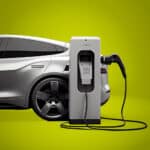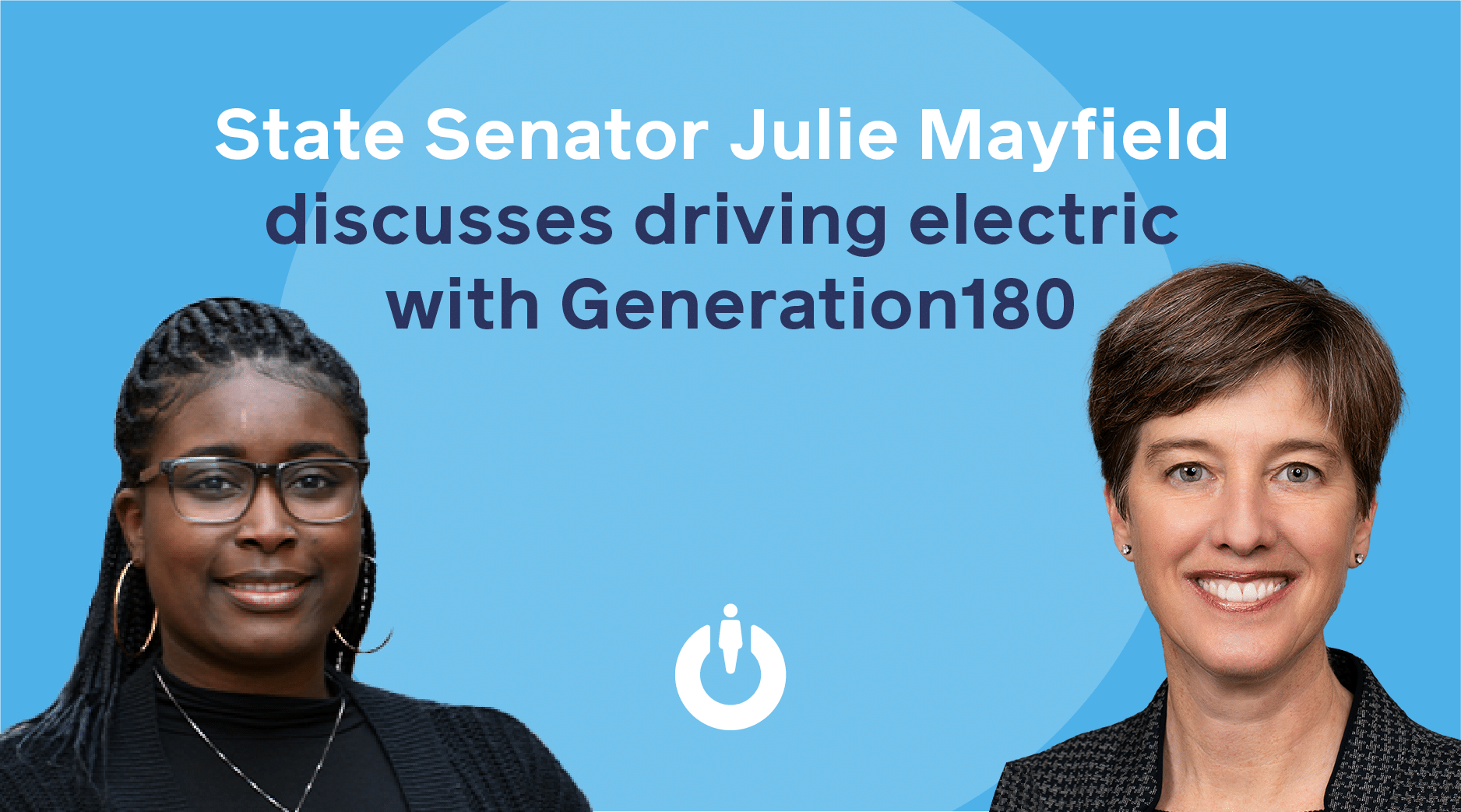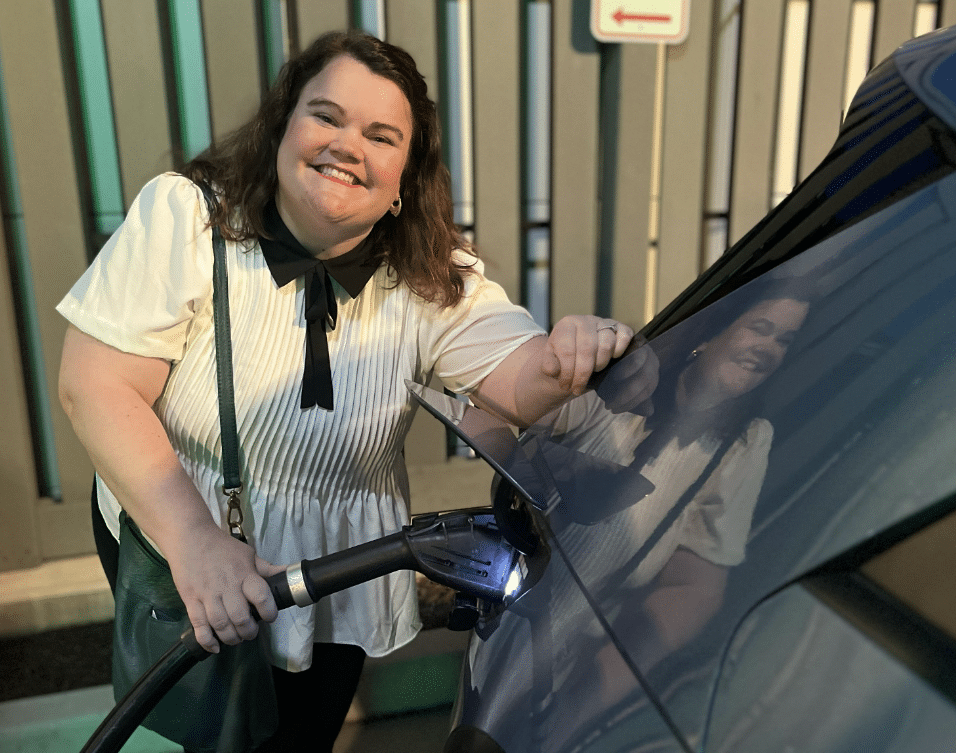State Senator Julie Mayfield is a passionate advocate for the environment, an electric vehicle (EV) enthusiast, and a key player in North Carolina’s legislative landscape. She sat down with Gen180’s Shakaya Cooper to share her journey as an EV owner and the challenges and triumphs that have shaped her commitment to a greener life.
From her early adoption of a used EV to her recent new EV purchase, State Senator Mayfield exemplifies the positive impact individuals can make by choosing EVs. Her decision to integrate electric vehicles into her life aligns with a broader vision for a cleaner, more sustainable North Carolina. She invites us to celebrate the joy of driving an EV, not just for its efficiency and advanced technology but for the profound satisfaction of knowing that every mile traveled is a step away from fossil fuel dependency.
Her experiences as a legislator underscore the need for policy support and incentives to encourage both individuals and businesses to contribute to the growing electric vehicle landscape. You can watch the recording here, or read the interview below.
——
Shakaya Cooper, Generation180: How long have you been an EV owner? And what make and model do you drive?
State Senator Julie Mayfield: I’m Julie Mayfield, and for the main purpose of this conversation, a North Carolina State Senator. I represent Senate District 49, which is Asheville, and most of Buncombe County.
My day job is that I work for an environmental advocacy organization called Mountain True, which focuses on the mountains of Western North Carolina. And I’m an environmental attorney. I’ve been doing environmental policy advocacy work for over 20 years now.
I bought my first EV in 2016: a used Nissan leaf that I got for less than $10,000, which was amazing. I remember that when we were test-driving it, I kept saying out loud, we’re going to buy this car. There’s no reason not to, it’s incredible.
I love that car and I would still drive that car if it would get me to Raleigh, but it won’t, and so my next EV I bought was the year that I was running for Senate. I bought a plug-in hybrid: a Chevy Volt, because I needed to be able to get to Raleigh. But also when I was just driving around town, I wanted to be fully electric, and that worked great. I ended up liking that car a lot more than I thought I would.
Just earlier this year, I bought a Tesla Model Y, when Tesla dropped the prices. I adore this car.
Gen180: I know you’ve said that you’ve been in this career path for almost 20 years, and you were an early-adopter of EVs, back in 2016. What drove your decision to purchase an EV instead of a gas-powered car?
Julie: As an environmental attorney, I’m well aware of the footprint that people leave on the planet, and part of my goal has always been to leave a very small footprint. I’ve been a vegetarian for 36 years. When I moved to North Carolina, I lived in a small, green-built house. We added solar panels to the house and we shop locally.
I reduce my footprint everywhere, in how I live, how I travel, how I eat, and how I buy things. So when it came time to purchase a car, it happened. I had been driving a 12-year-old Honda Civic, and I didn’t drive it very much, because I mostly took the bus.
But it was clear, we knew that our next car was going to be an electric vehicle. And I’m never going back!
I just can’t remember what even prompted us to begin looking for a new car. But it was clear, we just knew that the next car was going to be an electric vehicle. And I’m never going back!
Generation180: Did you take advantage of any State or Federal rebates or incentives available for your EV purchases? And if you did, how impactful were those incentives in your decision-making?
Julie: The first two, no, as they were both used cars, so there weren’t any incentives for those, but incentives did prompt the purchase of the Tesla, and because Tesla dropped the prices so drastically on the Model Y — almost $20,000. Then the $7,500 tax credit — awesome. Together that made me realize I could get this. What had been a $70,000 car with discounts and the $7,500 tax credit dropped even lower into the mid-’40s, so at that point, it was just a no-brainer.
It’s funny. I had been trying to talk my partner and other people into buying it, like this is such a great deal, you need to go get one of these cars. And then one day I was like, why am I not doing this? I’m the one who wants an electric vehicle.
Generation180: As an EV owner, what has commuting looked like, especially being in the rural part of North Carolina? As a legislator, I imagine you’re doing a lot of traveling.
Julie: When the legislature is in session – which is for many months in any given year, I drive to Raleigh every week. That’s 250 miles door-to-door for me in each direction. When I’m here in Asheville, I’m just driving around town. When I had my Volt which had a battery charge of about 54 miles, I could easily drive a day without ever switching over to gas.
Generation180: I mentioned earlier in our discussion that Gen180 is launching our Suburban Women EV Campaign. Women are generally underrepresented as EV owners across the country. Why do you think this is? What advice do you have for a woman, considering making the switch?
Julie: I think women just think less about cars than men do. I’m just going to go stereotypical here, but I am that stereotypical woman. I don’t care about cars. I don’t care about any of the technical stuff — I think a lot of women are like that. They just want a car that they think is safe and reliable. I do think women think a lot about fuel efficiency and cost.
I also think, until recently, if you’re a single person it’s hard to say I’m just going to have an electric vehicle. If you have to make a long trip you have to think about that a little bit. Especially if it’s not a Tesla, because the charging infrastructure is dismal for other cars. If I have to charge on my way back to or from Raleigh. It’s a 10-minute stop, as opposed to hours that it would be for a level-2 charger. Between my house and Raleigh I think there’s only one public level-2 charging station.
That’s the other thing if you’re a single woman and you are cost-conscious. Investing in an EV, especially a new EV, is big. If you are a parent and you have multiple kids and they’re in multiple activities. Then that cost barrier could be higher for you.
I now give myself a little bit more time when I’m going to Raleigh because I know that I’m going to have to stop. If I charge up to 100%, I don’t have to stop and I can get there. But generally, I would always stop at least once. I’d rest up and get something to eat, and it generally charges up again in that 10-minute time, enough to get me to town.
Generation180: What role might EVs play in bolstering North Carolina’s economic in greenhouse gas reduction goals?
Julie: The expansion of EVs is a key part of Governor Cooper’s clean energy strategy. Another part of his strategy has been to try to attract businesses that are in the EV space. For instance, the state has had a big economic development deal within the last 2 years Vinfast, the Vietnamese electric car maker.
He’s all-in on the charging infrastructure. North Carolina got a little over a hundred 1 million dollars for charging infrastructure in the IRA. Everything the governor can access in terms federal programs and dollars, he’s doing. I think we also might have we might have a Toyota battery plant coming to North Carolina.
The flip side is the other dynamic force in North Carolina is that the legislature is Republican-led. The legislature does not like EVs, does not care about EVs, and does not support any of the stuff that the governor is doing. I can’t even believe our legislature hasn’t installed a single EV charger at our building.
There are probably a dozen of us between the House and the Senate who have EVs and would love to have a charger at the Legislature Building. I have gone down that road a couple of times, and their response was – if we install an EV charger, then I guess we also have to install a gas pump.
Generation180: How do you bring that experience to the table as an EV owner, knowing what policies make sense to bring forward in the General Assembly? It sounds like the biggest thing is charging infrastructure for EVs.
Julie: That’s right. The infrastructure must be there. Thankfully there is a level 2 charger, just a block and a half away from the General Assembly.
One of the things I love is when the Southern Alliance for Clean Energy comes and does an EV day, and they let legislators drive all the cool electric cars. I think putting people in electric vehicles and helping them have that very direct experience behind-the-wheel is incredibly important.
I think putting people in electric vehicles and helping them have that very direct experience behind-the-wheel is incredibly important.
Generation180: You’re 3 times more likely to purchase an EV if you just passenger ride inside an EV.
Julie: I didn’t even know that. Once you get in them, and you realize how quiet they are. And then somebody steps on the accelerator and you realize how zippy they are. That can be exciting for a lot of people.
Generation180: I agree. I think, there’s an area just hearing you talk about the challenges and the dynamics among the legislators. There’s room there for conversations of being able to uplift the role local business owners bring to the table in this conversation.
Generation180: What is your favorite part about owning and driving an EV?
The best part about owning an EV is just knowing that I am not contributing to fossil fuel use. I am off that train, and that just makes my heart feel good.
Julie: The best part about owning an EV is just knowing that I am not contributing to fossil fuel use. I am off that train, and that just makes my heart feel good. It’s a huge piece of any individual’s carbon footprint and I have just taken it to zero for me, and that is what I love most about my car now.















